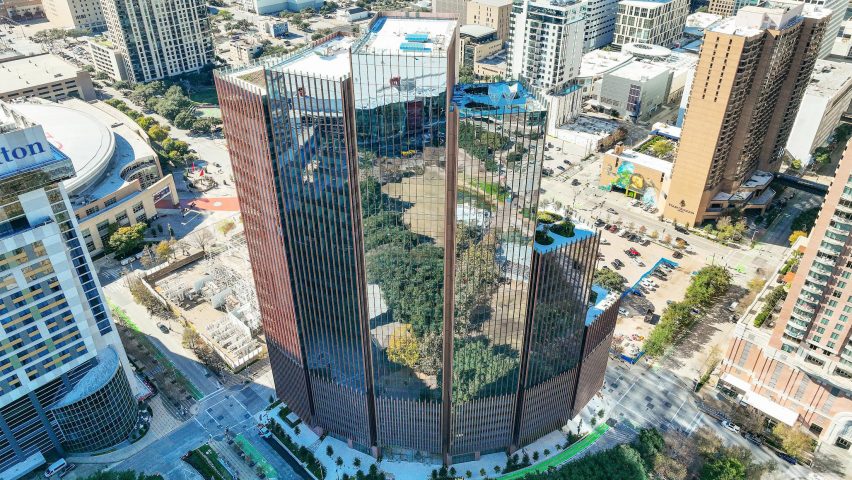Danish architecture studio BIG has unveiled 1550 on the Green in Houston, which is the studio's first skyscraper in the state of Texas.
Developed by Skanska USA, the 28-storey skyscraper across from Discovery Green park in Downtown Houston consists of a "bundle" of six towers that curve slightly as they rise, with the tallest of the masses reaching a height of 450 feet (137 metres).
"By breaking up the building into a bundle of towers, we created a dynamic quality to the building," BIG lead architect for the project Jenna Dezinski told Dezeen.
The procession of towers curves slightly, away from the adjacent park. Dezinski said that this allows for the park to feel like part of the building when viewed through the glass-lined ground floor.
At the higher end of the structure, BIG placed the core of the building, creating a thicker footprint than at other points.
"The core is attached to one side of the building instead of being in the centre of the building," said Dezinski.
For the facades, BIG mixed reflective glass with vertical fins that were placed "programmatically", according to Dezinski.
On floors three through eight, where the building's parking was placed, the fins were placed more densely, whereas on the higher floors, where there are offices, the fines are spaced allowing for more uninterrupted views.
The fins are aluminium, coloured a terracotta colour to create a "warm" effect that Dezinski said was used to create a "softness" to the site. These colours were mirrored in the pre-cast concrete visible on the facades of the ground floor.
A lobby was flanked by retail on either side, with a facade of floor-to-ceiling glass that alternates with the warm concrete. A slight cantilever of the floors above ground level creates overhangs for the perimeter of the building.
At the top of each stepped vertical element there is an open space with varying outdoor elements, all planted with greenery and designed by landscape studio SWA. Dezinski said that each of these areas was planted with a different "biome".
On the inside, many of the amenities spaces were designed by Austin-based studio Michael Hsu Office of Architecture. In spaces like lounges and the gym, the studio used warm colours and copper accents to match the facade.
Dezinski said that the breaking of the tower into separate vertical elements also allowed for an "interior rhythm" that benefits the inhabitants as the different massings allow for more corner offices.
Across the buildings, the spaces were divided into 60-foot by 60-foot (18 by 18 metres) "modules" that allow for more light to enter the entirety of the floors – as opposed to skyscrapers with thicker profiles that orient around a central core.
The team also noted that an Embodied Carbon in Construction Calculator, a tool used for benchmarking carbon used through materials, was used in the construction of the building, the first time this measurement tool was used in a Texas construction, according to the team.
Expansive rainwater collection systems were also included to offset water use for irrigating the green elements.
BIG has carried out other projects in Texas, including the design of a 3D-printed community near Austin, which is currently under construction.
Recently the studio released a design for a skyscraper with a cantilevered skybridge next to the United Nations building in New York.
The photography is courtesy of Skanska USA.

